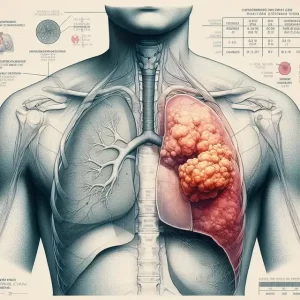mRNA Expression of IgA Antibodies for Passive Defense Against Bacterial Infections
- Brief Intermittent Exercise Reduces Heart Disease and Death Risk
- Personalized Lung Tumor Chips Assess PD-1 Therapy Response
- Study Shows Prior Infection Offers Strong Immunity to Original COVID-19 Strain
- Chinese Food Products Dominate Korean Tables Amid Safety Concerns
- Early Detection of Hypopharyngeal Cancer Possible with Saliva Diagnosis
- EB Virus Could Be Infected by Kiss: A Hidden Threat Linked to Cancer
The Latest from Moderna: mRNA Expression of IgA Antibodies for Passive Defense Against Bacterial Infections
- AstraZeneca Admits for the First Time that its COVID Vaccine Has Blood Clot Side Effects
- Was COVID virus leaked from the Chinese WIV lab?
- HIV Cure Research: New Study Links Viral DNA Levels to Spontaneous Control
- FDA has mandated a top-level black box warning for all marketed CAR-T therapies
- Can people with high blood pressure eat peanuts?
- What is the difference between dopamine and dobutamine?
- How long can the patient live after heart stent surgery?
The Latest from Moderna: mRNA Expression of IgA Antibodies for Passive Defense Against Bacterial Infections
The COVID-19 pandemic highlighted the immense potential of mRNA vaccine technology in combating infectious diseases.
Unlike traditional vaccines, the intrinsic advantage of mRNA as a platform technology lies in not requiring large-scale protein manufacturing and purification.
While the focus on mRNA technology has mainly centered on vaccines, this platform is also applicable for the expression of various human immune-related macromolecules.
For instance, at the end of 2021, Moderna released the results of a Phase 1 clinical trial for an mRNA vaccine against the Koenig’s disease virus, encapsulating mRNA encoding specific neutralizing monoclonal antibodies (mAb) within lipid nanoparticles (LNPs).
Research has also explored using mRNA to express broadly neutralizing antibodies (bnAb) targeting the HIV-1 envelope protein for preventing AIDS.
Immunoglobulin A (IgA) is the primary antibody isotype in human gastrointestinal and upper respiratory mucosal secretions, acting as the first line of defense against pathogenic and opportunistic bacterial pathogens in these areas. Humans have two IgA subtypes—IgA1 and IgA2.
B cells producing IgA are generated in mucosa-associated lymphoid tissue (MALT) to counter environmental antigens and mucosal pathogens.
B cells from MALT settle as resident plasma cells in mucosal tissues, secreting dimeric forms of IgA (dIgA).
dIgA is actively transported by polymeric immunoglobulin receptor (pIgR) across certain epithelial cell barriers and released as secretory IgA (SIgA) into mucosal secretions.
Both the primary form of IgG and the monoclonal IgA (mIgA) in circulation do not undergo active transportation by pIgR into mucosal secretions, leading to a clear distinction between systemic and mucosal antibody pools.
Mucosal surfaces of the gastrointestinal and upper respiratory tracts are consistently exposed to various resident microbial communities, as well as opportunistic and pathogenic bacteria. Foodborne pathogens like Salmonella Typhimurium (STm) easily invade intestinal tissues, and although antibiotic treatments can clear STm infections, drug-resistant bacterial subgroups may persist. Similarly, infections such as Pseudomonas aeruginosa (PA) once established in the lungs are challenging to eradicate.
Considering this, urgent measures are needed for preventive and therapeutic interventions to prevent bacterial pathogens from colonizing vulnerable tissues and to promptly clear infections. IgA is highly suited for these tasks, especially if pathogen-specific antibodies can enter mucosal secretions at sufficient concentrations to interfere early in the infection process.
Recently, mRNA vaccine giant Moderna published a research paper in Cell Reports Medicine titled: “An mRNA-based platform for the delivery of pathogen-specific IgA into mucosal secretions.”
This study utilized the LNP-mRNA platform to encode bacterial pathogen-specific immunoglobulin A (IgA) monoclonal antibodies, capable of being delivered into mucosal secretions, generating structurally and functionally complete human IgA, effectively defending against Salmonella Typhimurium (STm) and Pseudomonas aeruginosa (PA) invasion.
These findings indicate that mRNA-encoded antibody technology can serve as an effective means to intercept bacterial pathogens at mucosal surfaces, opening new pathways for preventive and therapeutic interventions.

Using IgA for passive immunity is not a new concept, but implementing it has been challenging due to obstacles in producing recombinant IgA (IgAR) and providing adequate quantities for sustained efficacy. Moreover, human IgA proteins are heavily glycosylated, posing challenges from a biopharmaceutical perspective because N-glycosylation affects conformation, thermal stability, folding efficiency, solubility, and susceptibility to protein hydrolysis.
Furthermore, IgAR is difficult to handle for most clinical applications as it exhibits a shorter serum half-life compared to IgG and is cleared more rapidly from circulation than endogenous human IgA. Research is ongoing to generate IgG/IgA chimeras with the required Fc receptor interaction, longer serum half-life, and mucosal delivery but has not yet reached the clinical stage.
In this latest study, the research team used synthetic mRNA to generate structurally and functionally complete human IgA in vivo.
Sal4, an IgA monoclonal antibody, recognizes the lipopolysaccharide O5−antigen of Salmonella Typhimurium (STm), which has been shown to reduce STm invasion in the gut. CAM003, an IgG1 monoclonal antibody, binds to the biofilm component Psl of Pseudomonas aeruginosa (PA) and has demonstrated protective effects in various animal models.
The research team encoded the heavy chain (HC), light chain (LC), and J chain of Sal4 and CAM003 separately as mRNA for human IgA2 (IgA2mRNA) or IgA1 (IgA1mRNA). These were characterized in vitro and in vivo, comparing them to recombinant IgA (IgAR) to evaluate the potential of the mRNA platform in producing potent and protective mucosal monoclonal antibodies.

The results showed that compared to recombinant IgA (IgAR), the mRNA-generated IgA delivered by lipid nanoparticles (LNPs) exhibited significantly prolonged serum half-life and a glycosylation profile closer to the natural state. mRNA encoding STm-specific IgA markedly inhibited bacterial invasion into the gut. Similarly, mRNA encoding PA-specific IgA effectively protected the lungs from infection.
These results demonstrate that mRNA-encoded antibody technology can serve as an effective means to intercept bacterial pathogens at mucosal surfaces, paving the way for new preventive and therapeutic interventions.
The Latest from Moderna: mRNA Expression of IgA Antibodies for Passive Defense Against Bacterial Infections
(source:internet, reference only)
Disclaimer of medicaltrend.org
Important Note: The information provided is for informational purposes only and should not be considered as medical advice.



